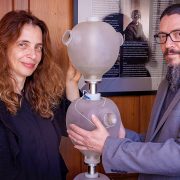SymbioticA: provoking dialogue about artful science
Art is supposed to do the avant-garde, be radical and ask the deepest questions about life and about the position of the human in this world. For almost 20 years, UWA’s SymbioticA has been interested in the growing gap between our cultural understanding of life and what we know about life through science. But more importantly, what we choose to do to life through technology. Through their exhibitions and research the group has developed new technologies, influenced policymaking and articulated cultural ideas around scientific knowledge in the pursuit of critiquing the ethical and cultural issues of the manipulation of life.




